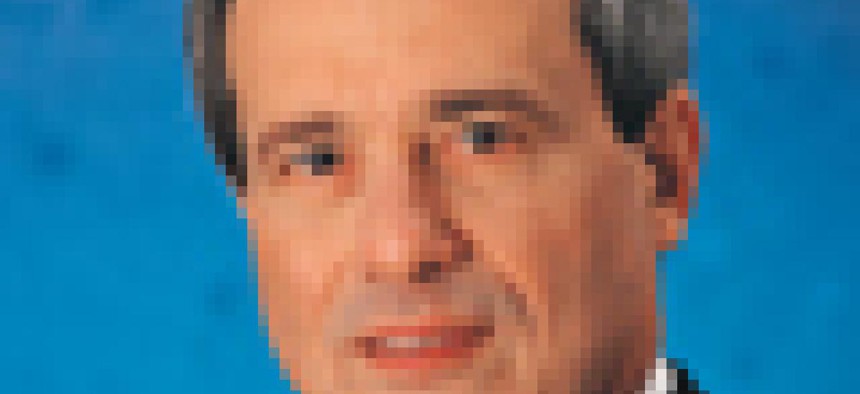DynCorp Dusts Off New Business Structure

DynCorp of Reston, Va., will realign its business units to pursue more aggressively information technology services and outsourcing opportunities as the company shoots for $2.5 billion in revenue by 2001.
By Nick WakemanStaff WriterDynCorp of Reston, Va., will realign its business units to pursue more aggressively information technology services and outsourcing opportunities as the company shoots for $2.5 billion in revenue by 2001.The new structure, which takes effect Jan. 1, is a melding of three business units into two at the $1.3 billion systems integrator that plucks most of its business from the government. Under the umbrella of the new Information and Enterprise Technology unit will be employee-owned DynCorp's IT services and outsourcing businesses. The new Technical Services unit will handle DynCorp's aviation, maintenance and logistics services. This unit will reap about $600 million in 1998.The enterprise technology unit, which is expected to have more than $750 million in revenue in 1998, will lead the company's growth going forward, said Paul Lombardi, DynCorp's president and chief executive officer. "We see tremendous growth in information technology and network management arenas and in outsourcing of noncore government functions," Lombardi said. "And we didn't believe our organization reflected that." DynCorp's move comes on the heels of similar steps taken by other systems integrators. Both Computer Sciences Corp. of El Segundo, Calif., and Electronic Data Systems Corp. of Plano, Texas, have revamped their government units in the past year to better position themselves in the market.As part of its reorganization, DynCorp has established five vertical government divisions under the enterprise technology unit: health information technologies, outsourcing solutions, security and intelligence, systems and technology services and seat management."These are the areas we see growing faster than other elements of the marketplace," Lombardi said. The company plans to stay primarily a government contractor concentrating on the federal market but wants to grow its state and local business.DynCorp did about $40 million in the state and local market in 1998, up from next to nothing a few years ago, Lombardi said. Work with the Defense Department represents about 48 percent of revenue; civilian work, including state and local, brings in another 47 percent. Commercial work accounts for 5 percent of revenue. In 1997, the company had about $1.1 billion in revenue.Thomas Meagher, a director with the investment banking firm Boles Knop & Co. of Middleburg, Va., said DynCorp's realignment is another sign the company is moving away from its facilities maintenance and aerospace services work, which have lower margins. "The corporate emphasis is definitely on IT services," Meagher said. "My expectation is that they are going to continue to develop and grow that business."Lombardi plans to couple strong internal growth, which was better than 15 percent in 1998, with acquisitions of government IT companies. He declined to say how many deals are in the works or if any acquisitions are imminent.DynCorp completed only one deal during 1998, the purchase of FMAS Corp., a Rockville, Md., company that specializes in medical outcome measurements and data abstraction services. FMAS brought about $30 million in annual revenue to DynCorp, but gave the company substantial, added capabilities to health care IT services, Lombardi said.DynCorp must pick up the pace of its acquisitions in order to reach its growth goals, said John Allen, vice president of Quarterdeck Investment Partners of Los Angeles. "They've got to capitalize now, their peers are getting bigger," Allen said. "They need to make a sizable deal and a few niche acquisitions."Lombardi said he wants to make a deal in the $200 million to $300 million range along with smaller acquisitions. "If we are to survive in this land of giants, we cannot be a Lilliputian," he said.A foray into the public market also is part of the company's strategic plan through 2001, but Lombardi was coy about when that might happen. "Eventually, inevitably, we are going to have to seek the public markets," he said.Right now, DynCorp doesn't need to be publicly traded to make substantial acquisitions, Lombardi said. "We have not seen any constraints [for deals worth] upward of $400 million," he said. "We could finance that without being a public company."The realignment should help accelerate DynCorp's growth both internally and through acquisitions, because it shows the company is focusing on information technology, Allen said.DynCorp has won some large contracts in the past year, and the added capabilities acquisitions can bring will help DynCorp exploit those contracts, he said. "Acquisitions will bring them more talent that they can push through these vehicles," he said.Lombardi called 1998 DynCorp's most successful year in contract wins: The company bid on $7 billion worth of contracts and won $3.8 billion in new work.Among its wins were places on both the General Services Administration's $10 billion Seat Management contract and NASA's $9 billion Outsourcing Desktop Initiative contract. Both of those contracts have multiple winners, and DynCorp has booked no business under them.But the company also has won sole source awards, such as a $300 million contract to support asset forfeitures for the Justice Department, a $187 million subcontract from TRW Inc. of Cleveland to support work with the U.S. Census Bureau, and a pair of contracts worth $243 million with the U.S. Postal Service for information technology support and logistics."They've demonstrated that they can win contracts," Allen said. "The key now is to make them more profitable."


Paul Lombardi, DynCorp
NEXT STORY: World Wide, FileNet Offer Solutions, Services